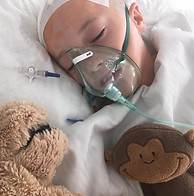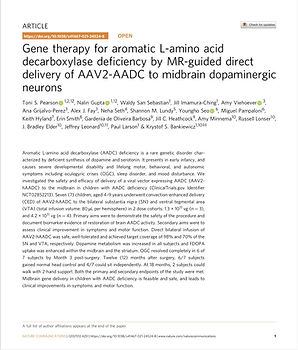Latest News
The Journal of Inherited Metabolic Disease has updated the AADCd Visual Abstract to reflect the decision by NICE to approve the gene therapy treatment eladocagene exuparvovec / Upstaza for use in the UK.
The European Medical Association (EMA) has granted marketing authorisation for Upstaza (eladocagene exuparvovec) in the European Union (EU) ...
As promised we bring you the latest updates from around the world as they happen.
PTC Biotherapeutic's gene therapy drug Upstaza has been granted license for use in the European Union, for the treatment of Aromatic Amino Acid Decarboxylase deficiency.
Looking ahead, it is important to remember that all AADCd children share a mild, moderate or severe form of this complex disease, based on mutations and remain biochemically serotonin deficient after gene therapy treatment.
Treating only the dopamine pathway means we must remain vigilant regarding autonomic dysfunction and other non dopamine related symptoms since the discrepancy between these two chemicals changes post treatment. We look forward to the longitudinal data, following our European children, after receiving gene therapy and pray for a continuous positive response.
We are grateful science is advancing and that, over the past 17 years, The AADC Research Trust has had the opportunity to be an important part of driving this and other innovative gene therapy treatments forward.
We remain hopeful, that one day, we can finally say AADCd is completely cured.
To read the full article please click on the image ...
Gene Therapy Updates ...

The National Institute for Healthcare and Excellence (NICE) has approved gene therapy drug eladocagene exuparvovec / Upstaza for the treatment of AADCd children in the UK. This monumental moment comes after many many months of working closely with NICE during their appraisal process to ensure the best outcome for the AADCd community.
The Trust is thrilled with this announcement and will continue to consult with NICE and the NHS on the roll out of this treatment once the final draft guidance is issued in April.
Data published by Professor Krystof Bankiewicz; AAV2-AADC Gene Therapy to the Mid-brain ...
Professor Krystof Bankiewicz and Dr Toni Pearson have published data on their trial; AAV2-AADC Gene Therapy to the Substansia Nigra Pars Compacta & Ventral Tegmental area of the brain.
The open access article is titled 'Gene therapy for aromatic L-amino acid decarboxylase deficiency by MR-guided direct delivery of AAV2-AADC to midbrain dopaminergic neurons.' It is a comprehensive study, covering an age range of 4 - 26 years in age and various AADC mutation combinations. The outcomes are clearly positive with a cessation of Oculogyric Crisis, the most common AADCd symptom, in almost all patients.
More AADCd Children receive Gene Therapy in Poland & USA ...
2020 and 2021 have brought many challenges with the emergence of COVID-19. Many aspects of our lives have been put on hold.
Essential surgeries, including AAV2-hAADC Gene Therapy Treatment, had to be postponed due to the extremely difficult circumstances posed by the threat of COVID.
However, Professor Bankiewicz and his incredible team have gone to extraordinary lengths to meet that challenge...
The AADC Trust is thrilled to share the wonderful news that three more AADCd children have received Gene Therapy. Two received treatment in Poland and one received treatment in the USA ...

Meet 11 year old Julia from Norway.
Julia is the 21st AADCd child to receive
AAV2-hAADC Gene Replacement Therapy.

Meet 10 year old Paul from Germany.
Paul is the 22nd AADCd child to receive
AAV2-hAADC Gene Replacement Therapy.
Meet 6 year old Jamell from the USA.
Jamell is the 23rdd AADCd child to receive
AAV2-hAADC Gene Replacement Therapy.




